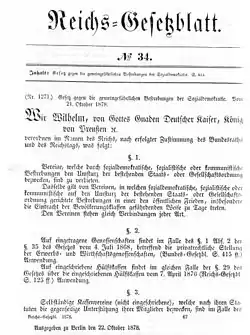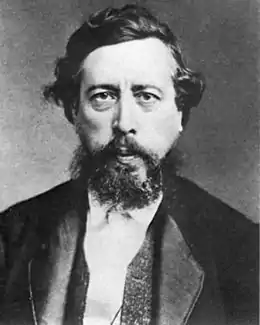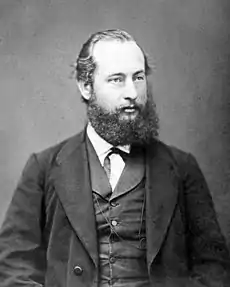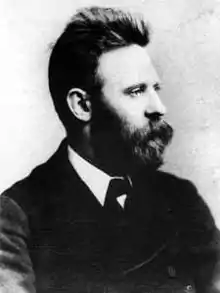Anti-Socialist Laws
The Anti-Socialist Laws or Socialist Laws (German: Sozialistengesetze; officially Gesetz gegen die gemeingefährlichen Bestrebungen der Sozialdemokratie, approximately "Law against the public danger of Social Democratic endeavours") were a series of acts, the first of which was passed on 19 October 1878 by the Reichstag lasting until 31 March 1881 and extended four times (May 1880, May 1884, April 1886 and February 1888).[1]

The legislation gained widespread support after two failed attempts to assassinate Kaiser Wilhelm I of Germany by the radicals Max Hödel and Karl Nobiling. The laws were designed by Chancellor Otto von Bismarck with the goal of reversing the growing strength of the Social Democratic Party (SPD, named SAP at the time) which was blamed for inspiring the assassins. However, the laws caused the socialist movement to strengthen at times. This resulted in Bismarck dropping the laws and changing his coalition, eventually becoming an ally of his former enemies the Catholic Centre Party which appealed to Catholic workers who opposed socialism.[2]
Laws
Although the law did not ban the SPD directly, it aimed to cripple the organization through various means. The banning of any group or meeting of whose aims were to spread social-democratic principles, the outlawing of trade unions and the closing of 45 newspapers are examples of suppression. The party circumvented these measures by having its candidates run as ostensible independents, relocating publications outside of Germany and spreading Social Democratic views as verbatim publications of Reichstag speeches which were privileged speech with regard to censorship.
The law also banned the display of emblems of the Social Democratic Party. To circumvent the law, Social Democrats wore red bits of ribbons in their buttonholes. However, these actions led to arrest and jail sentences. Subsequently, red rosebuds were substituted by the Social Democrats. These actions also led to arrest and jail sentences. The judge ruled that in general everyone has a right to wear any flower as suits their taste, but it becomes a party emblem when socialists as a group wear red rosebuds. In a final display of protest against this clause of the anti-socialist laws, female socialists began wearing red flannel petticoats. When female socialists wanted to show a sign of solidarity, they would lift their outer-skirts. Female socialists would display in protest their red petticoats to the police, who were constrained by social norms of decency from enforcing this new sign of socialist solidarity.[3]
The laws' main proponent was Chancellor Otto von Bismarck, who feared the outbreak of a socialist revolution similar to the one that created the Paris Commune in 1871. Despite the government's attempts to weaken the SPD, the party continued to grow in popularity. A bill introduced by Bismarck in 1888 which would have allowed for the denaturalization of Social Democrats was rejected. After Bismarck's resignation in 1890, the Reichstag did not renew the legislation, allowing it to lapse.
Timeline
- 11 May 1878: two shots fired at Wilhelm I by Max Hödel.
- 17 May 1878: the Prussian government demands the Bundesrat ban the SPD. In the Reichstag, only conservatives supported the bill.
- 2 June 1878: Wilhelm I is shot by Karl Nobiling.
- 11 June 1878: the Reichstag dissolved.
- 30 July 1878: in new elections, socialists lose three of their 12 seats. The Anti-Socialist bill is passed by the two conservative parties and the National Liberals.
- 19 October 1878: the bill passed by 221 to 149. The Social Democrats voluntarily dissolved the party.[4][5]
- 18 November 1878: a minor state of siege is declared in Berlin, with 67 Social Democrats expelled.
- 21–23 August 1880: the Wyden[6] party congress sees the expulsion of Johann Most and Wilhelm Hasselmann for anarchism by the SPD's moderate wing.
- 28 October 1880: a minor state of siege is declared in Hamburg.
- 4 April 1881: the Social Democrats back accident insurance but demand several amendments.[7]
- June 1881: a minor state of siege is declared in Leipzig, with local SPD organization destroyed.
- 8 September 1881: the moderate socialist Louis Viereck begs Friedrich Engels to tone down the radicalism of the party newspaper Sozialdemocrat[8]
- 19–21 August 1882: a secret conference in Zürich is organized by Bebel, partly healing the division between moderates and radicals.[9]
- 1883: the Anti-Socialist Laws partly are relaxed, strengthening the SPD.[10]
- March 1883: a secret Copenhagen Congress condemns State Socialism.
- 13 January 1885: the Frankfurt police chief Rumpf is stabbed to death by the young anarchist Julius Lieske.[11]
- 2 April 1886: the Reichstag votes 173 to 146 to renew the Anti-Socialist Laws.
- 11 April 1886: the Prussian interior minister Puttkaner issues the strike decree which gives the police the power to use the Anti-Socialist Laws against strikers and expel their leaders.
- 11 May 1886: political meetings in Berlin now need police permission 48 hours before.[12]
- 20 May 1886: a minor state of siege is declared in Spremberg.
- 31 July 1886: nine Social Democratic leaders are convicted at the Saxon state court for joining an illegal organization.
- 16 December 1886: a minor state of siege in is declared Frankfurt am Main.
- 15 February 1887: a minor state of siege is declared in Stettin.
- 2–6 October 1887: the St. Gall party congress results in Bebel defeating his opponents.
- Fall 1887: Bismarck fails to get the Social Democratic leaders expelled from Germany.
- 2 May 1889: a coal miners strike in the Rühr is not supported by the SPD
- 14–20 July 1889: the Second International is founded in Paris.
- 25 January 1890: the Reichstag refuses to renew the Anti-Socialist Laws.
- 20 February 1890: the Social Democrats win 19.75% of the vote.
- 18 March 1890: Bismarck resigns.
Prominent Social Democratic members of the Reichstag during the period
 Wilhelm Liebknecht
Wilhelm Liebknecht
(1826–1900) August Bebel
August Bebel
(1840–1913) Wilhelm Hasenclever
Wilhelm Hasenclever
(1837–1889) Johann Most
Johann Most
(1846–1906)
References
- Lidtke (1966), 339.
- John Belchem and Richard Price, eds. A Dictionary of 19th-Century World History (1994) pp 33-34.
- "Metropolitan. v.38 1913". HathiTrust. p. 63. Retrieved 2 March 2019.
- Lidtke (1966), 119.
- Lidtke (1966), 70–77.
- Lidtke (1966), 82.
- Lidtke (1966), 159.
- Lidtke (1966), 131.
- Lidtke (1966), 135–38.
- Lidtke (1966), 273.
- Lidtke (1966), 125.
- Lidtke (1966), 244–46.
Further reading
- Bonnell, Andrew G. "Socialism and Republicanism in imperial Germany." Australian Journal of Politics & History 42.2 (1996): 192–202.
- Hall, Alex. "The War of Words: Anti-socialist Offensives and Counter-propaganda in Wilhelmine Germany 1890-1914." Journal of Contemporary History 11.2 (1976): 11–42. online.
- Lidtke, Vernon L. The Outlawed Party: Social Democracy in Germany, 1878-1890. Princeton, NJ: Princeton University Press, 1966. online free to borrow.
- Lidtke, Vernon L. "German social democracy and German state socialism, 1876–1884." International Review of Social History 9.2 (1964): 202–225. online.